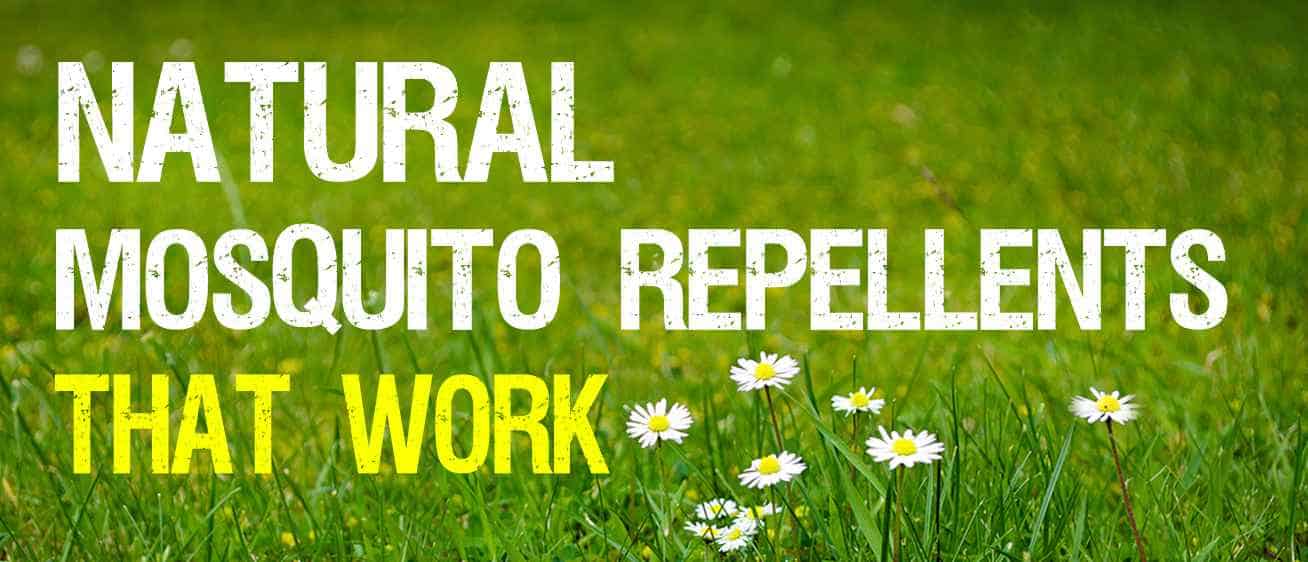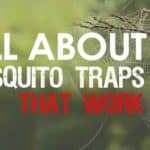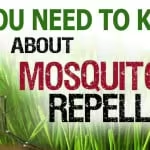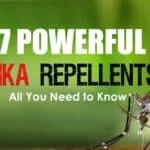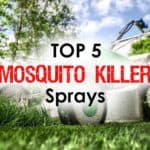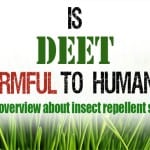Mosquito borne diseases are dangerous. So is putting potentially harmful chemicals on your skin.
- That’s why there are a numerous natural mosquito repellents available.
- But are they working reliable?
I’ll give you a short overview about DEET-free repellents that have been proved to work and tell you what products you should avoid.
The best natural repellent
Oil of Lemon Eucalyptus (OLE) is a natural ingredient that is working against mosquitoes and has been registered with the EPA.
The only way to get approved is enough scientific evidence. Many studies have shown that Oil of Lemon Eucalyptus protects from mosquito bites1.
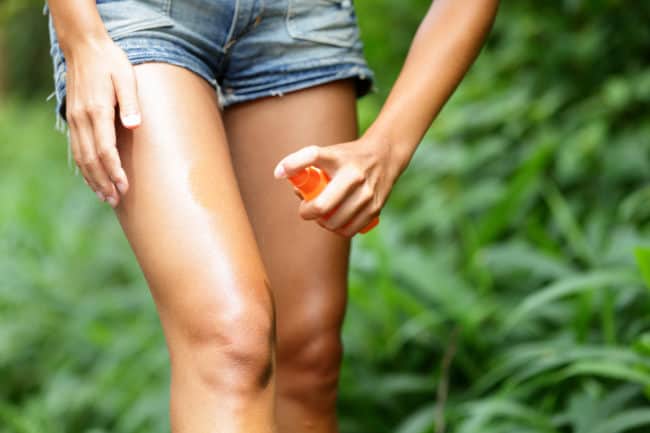
The stuff responsible for making OLE work against bugs is p-menthane-diol (PMD). It can either be derived naturally (through the Lemon Eucalyptus tree) or synthetically (in the lab).
PMD from both sources has the same features in regard to safety and side effects. Synthetic PMD might even work better against mosquitoes because it’s more stable than the natural oil.
If you want to buy a genuine natural spray be careful to read the label and check the ingredient’s origin.
Be careful to not use it with children under 3 years old.
Some people might experience skin irritations but from my experience it’s not very likely. Many OLE products also contain a lot of alcohol so generally keep any sprays away from children.

In comparison products with Oil of Lemon Eucalyptus last longer than most other natural ingredients. During my field test I usually stay bite-free for around 3 hours before I have to reapply the repellent. The natural spray I use the most is:
Repel Lemon Eucalyptus Natural Insect Repellent
It’s a DEET-free spray that works very well against all kinds of mosquitoes and a lot of other bugs too. It is one of the most reliable natural repellents available.

- Viable alternative to low %-DEET
- Suitable for all fabrics
- For short and medium trips
Last update on 2024-04-19 / Affiliate links / Images from Amazon Product Advertising API
Repel Lemon Eucalyptus is my favorite pick when it comes to natural mosquito repellents.
There are some other natural alternatives to OLE but they cannot compare in regard to protection, durability and reliability. In case you want to try something different, one of the most popular competitors is:
Citronella oil
Scientific studies have shown that this ingredient is helping against mosquitoes. However it only works for short amount of times. After 30-60 minutes it has to be reapplied again to guarantee effective protection2.
From my experience this is way too short for many occasions.
- If you’re hiking or camping you don’t want to apply the spray every half hour.
- It’s very likely that you forget it and risk to get bitten by harmful mosquitoes.
- They also work less reliable or not at all.
However you might want to give it a try if you just go out for a short walk or visit low risk mosquito vectors.
The big advantage of citronella oil is that it has not many side effects and is considered safe for most people. Sprays with it also smell very nice and not as chemical as other repellents.
No products found.
Be careful to buy an actual repellent like the Skedattle Natural Insect Repellent Spray though. 100% citronella oil is sold as well but it’s a completely different thing.
Pure citronella oil is suitable for aromatherapy but does not work against fighting mosquitoes. In addition it might cause some serious skin irritations.![]()
Are natural repellents better?
In my extensive guide I compared all mosquito repellents that are backed up by scientific evidence. While there are effective natural repellents some of the best choices contain ingredients from non-natural sources.

Both synthetic and natural mosquito repellents can cause side effects. Natural ones are not necessarily safer or protect better. In comparison to the dangers of mosquito borne diseases however the potential risks are very low.
If you experience problems with any ingredient the best thing to do is to switch to a different ingredient that causes less side effects.
In my opinion there is no need to limit yourself to natural repellents only because the artificial ones sometimes have advantages, e.g. they last considerably longer. I would recommend that you look at all the choices available and then decide on a spray fits your needs.
Other natural alternatives
There are an endless number of other ‘natural’ products out there but I found that most of them don’t work as reliable as the sprays above. A wristband won’t protect all of your exposed skin and you risk transmittance of dangerous diseases like Zika.
No products found.
Plant oils or neem oil can have some serious side effects and might not work when you need them3. Effectiveness not only depends on the ingredients’ quality but also on exact formulation. I would not want to put my life at risk relying on those.
Taking additional doses of Vitamin Bs has not been shown to work effectively against mosquito bites4. It’s only useful to the person who tries to sell you expensive pills. Any other vitamins or foods could not be linked to better protection.
There are enough scientifically backed repellents that are natural and work. In my opinion there’s no need to rely on bogus products.
Some of those natural solutions might work for some people but I’m sure you don’t want to risk your own life finding out if it does for you. I recommend that you choose one of the options above. You might also want to try out a non-natural repellent if you are in high risk environments.
Minimize the need of repellents
There are a number of strategies to cut down the use of potentially harmful insect sprays. While some might not be feasible others can allow you to apply way less chemicals. Take action because these tips will make your life way easier:

- You can try to use natural mosquito killers in your garden to prevent the offspring from hatching. A small population is a lot easier to control.
- Cover your exposed skin with clothes. It not only helps against the sun but also against mosquito bites.
- Use a fan or air-con. Mosquitoes and no-see-ums have a hard time to stay on your skin if there’s a breeze.
- Use traps like mosquito zappers which can help to diminish the number of mosquitoes in small areas (like your patio or your living room).
From my experience none of these solutions works 100% against mosquitoes. Even if you diminish your garden’s mosquito population that will still be some bugs flying around. However you can fight them with way less repellent on your skin than before.
Conclusion
Overall natural repellents can be a viable alternative to sprays with DEET. As long as you know their limits and you choose an ingredient backed up by scientific evidence they are quite safe to use.
While natural solutions can have advantages like organic origins or less environmental impact they are not necessarily better than their synthetically counterparts in regard to mosquito protection.
That’s why I advise you to not limit yourself to one type of repellent. Choose the one that fits your needs and watch your body closely. Together with additional strategies like clothing you will stay fine in most situations.
Sources
- Goodyer, LI PhD et al. Expert Review of the Evidence Base for Arthropod Bite Avoidance, Journal of Travel Medicine, Volume 17, Issue 3, May 2010. http://jtm.oxfordjournals.org/content/17/3/182.article-info
- Kim, Jeong-Kyu; Kang, Chang-Soo; Lee, Jong-Kwon; Kim, Young-Ran; Han, Hye-Yun; Yun, Hwa Kyung (2005). “Evaluation of Repellency Effect of Two Natural Aroma Mosquito Repellent Compounds, Citronella and Citronellal”. Entomological Research 35 (2): 117–20. doi:1111/j.1748-5967.2005.tb00146.x.
- Ives AR, Paskewitz SM. 2005. Testing vitamin B as a home remedy against mosquitoes. J Am Mosq Control Assoc 2005; 21:213–217. http://www.ncbi.nlm.nih.gov/pubmed/16033124? dopt=Abstract
- Boeke SJ, Boersma MG, Alink GM, et al. 2004. Safety evaluation of Neem (Azadirachta indica) derived pesticides. J Ethnopharmacol 2004; 94:25–41. http://www.sciencedirect.com/science/article/pii/S0378874104002491
Hi! My name is Mark and I’m an outdoor freak.
Visiting many exotic places around the world allowed me to gain some knowledge about effective mosquito control. That’s why I decided to start this site and give you in-depth reviews regarding the best repellents and traps.
And yes, you may call me Mosquito Mark.
